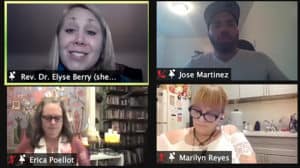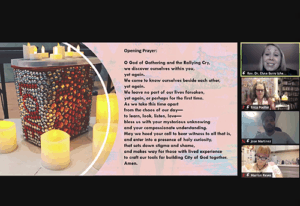‘Transforming the Overdose Crisis’ Workshop Provides Meaningful Start to CHHSM’s General Synod Activities

The UCC’S Council for Health and Human Service Ministries kicked off its involvement in the denomination’s General Synod 33, being held virtually July 11-18, participating in a workshop for delegates on “Transforming the Overdose Crisis: Creating Communities and Congregations of Care.”
The workshop, taped live July 8, was presented by the UCC’s Overdose and Drug Use Ministries (ODUM). Presenters included the Rev. Elyse Berry, D.Min., CHHSM’s associate for advocacy and leadership development, and three representatives of the National Harm Reduction Coalition, an ODUM partner: Erica Poellot, ODUM project director and director of faith community partnerships for the Harm Reduction Coalition in New York City; Marilyn Reyes, a senior peer with Harm Reduction Educators in New York City; and Jose Martinez, a harm reduction associate with the National Harm Reduction Coalition.
The workshop focused on changing attitudes and responses to people who use drugs, and was structured to highlight ODUM’s newly-released toolkit for transforming the overdose crisis through the creation of congregations and communities of care. It offered practical ways local churches and individuals can help create a safe space for helping people who use drugs overcome their obstacles. The session also touched on the importance of finding new ways of preventing overdose through education, compassion and treating all people with dignity.
The overarching theme was supporting and loving, and showing God’s love to people with lived experience of drug use, and changing perception from a punitive attitude of retribution to one of restorative justice.
After an opening prayer by Berry and a moment of land acknowledgment to Indigenous ancestors, the workshop focused on the personal stories of Poellot, Reyes, and Martinez — their struggles, recovery, and ongoing work to reduce overdose death and help others who use drugs.
“Workshops like this one are not just an offering of important information — which is helpful and needed — they are an encounter with community, and as community,” said Berry in an interview following the workshop. “The profound sharing of personal stories by the presenters created a space of vulnerability and truth-telling, and this opens us to come as we are: with questions, confusion, grief, frustration, curiosity, humility, connection, hope, or all of the above.”
The practical suggestions for action were grouped in four areas: hospitality, compassionate care, community building, and advocacy. Many of the suggestions require a gradual change in the attitude of individuals who have been inundated in a system that treats drug users in punitive fashion, as opposed to loving kindness. “In our world full of intersecting systems of oppression that treat people, especially those who use drugs, as disposable, the ODUM workshop — and its continuing work — is a source of living water to claim my own self-worth and to imagine what true liberation entails for all of us,” added Berry.
In discussing hospitality, Poellot detailed her work in a Judson Memorial Church and Harm Reduction Coalition monthly “Family Love Feast” outreach event. She cited her work with Judson as one where the church is finding ways to tend to its growing edges and do more meaningful outreach in the New York City community.
Among the many points Poellot raised was the importance of church members hearing drug issues talked about from the pulpit, which encourages them to bring their own stories and wisdom to the community. Poellot said that it is important for individuals to hear their children and loved ones addressed by a faith community, often for the first time. She also encouraged local churches to provide space for self-help groups.
Martinez reviewed helpful compassionate care ideas, including hosting a harm reduction worship service in local communities and providing space on church property for mobile harm reduction providers to deliver services to community members. “Many times, our people are forgotten when they die,” he said, so “can we show up with compassion and care for our community?”
In discussion community building, Reyes talked about a South Bronx partnership with a Queens church that does a community event every month, giving out food and clothing, as well as harm reduction materials and more. She suggested local churches connect to a broader movement to end overdose, hosting overdose listening sessions, joining the UCC ODUM working group, and training church members and leadership on overdose response, among other items.
Berry then focused on advocacy, emphasizing ways individuals can become advocates in their churches, communities, and cities. She encouraged attendees and their local churches to reach out to ODUM, Faith in Harm Reduction, and other national drug policy organizations to find out what advocacy issues need support in their communities; and to advocate for harm reduction funding at local, state and federal levels.

Education is key, Berry said, and suggested a good way to start was on the UCC’s Harm Reduction and Overdose Awareness Sunday, which takes place Aug. 22 this year. She also stressed that it was important to lift up the presence and humanity of people with lived experience of drug use in the congregation through full inclusion in church life, including leadership, liturgy, and outreach.
Before opening up for questions, the presentation closed with a call to action, which stressed, “We are being called … to learn from and with people who use drugs, the ways of life saving, of life giving, to see the Divine in one another, to call one another by name, that name is Beloved.”
A short Q&A session followed the presentation, with many of the three dozen attendees voicing both their support and thanks to the presenters for being so willing to share their personal stories. Following the Q&A, the workshop closed by providing a series of links to important resources (see below).
The workshop will be available for registered Synod goers through August. Click on the workshops link in the black bar at the top of your registration page link.
Transforming the Overdose Crisis Resources
For information on joining the Overdose and Drug Use Ministries mailing list, requesting an overdose prevention kit/naloxone for you or your congregation, inviting Overdose and Drug Use Ministries to partner with you and your congregation/conference, or applying to join the ODUM Working Group, contact ODUM .
Download the Spirit of Harm Reduction: Toolkit for Communities of Faith Facing Overdose (created by Faith in Harm Reduction).
Access CHHSM’s Advocacy Toolkits, including its kit on Mental Health and Substance Use.
Additionally, an ODUM toolkit will be released within the next few weeks.
Join Our Mailing LIst
"*" indicates required fields
Follow on Facebook
Hoyleton Time Capsule Reveals Treasure Trove of History - CHHSM
www.chhsm.org
Old newspaper articles, newsletters — some in German, a letter from the past describing an effort that would become a successful CHHSM ministry. These were among the treasures discovered during the ...